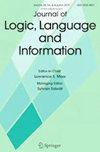无定语从句的命题逻辑
IF 0.6
3区 数学
Q4 COMPUTER SCIENCE, ARTIFICIAL INTELLIGENCE
引用次数: 0
摘要
本文讨论的是 "To be human is to be an animal"、"To live is to fight "等形式的句子。我称它们为 "不定式句子"。我定义了一种能够表达它们的增强命题语言,并给出了基于矩阵的语义。我还给出了一个表证明系统,称为 "不定式逻辑 IL"。我证明了健全性、完备性和一些基本定理。本文章由计算机程序翻译,如有差异,请以英文原文为准。

Propositional Logic for Infinitive Sentences
This paper is about sentences of form To be human is to be an animal, To live is to fight, etc. I call them ‘infinitive sentences’. I define an augmented propositional language able to express them and give a matrix-based semantics for it. I also give a tableau proof system, called IL for Infinitive Logic. I prove soundness, completeness and a few basic theorems.
求助全文
通过发布文献求助,成功后即可免费获取论文全文。
去求助
来源期刊

Journal of Logic Language and Information
COMPUTER SCIENCE, ARTIFICIAL INTELLIGENCEL-LOGIC
CiteScore
1.70
自引率
12.50%
发文量
40
期刊介绍:
The scope of the journal is the logical and computational foundations of natural, formal, and programming languages, as well as the different forms of human and mechanized inference. It covers the logical, linguistic, and information-theoretic parts of the cognitive sciences.
Examples of main subareas are Intentional Logics including Dynamic Logic; Nonmonotonic Logic and Belief Revision; Constructive Logics; Complexity Issues in Logic and Linguistics; Theoretical Problems of Logic Programming and Resolution; Categorial Grammar and Type Theory; Generalized Quantification; Information-Oriented Theories of Semantic Structure like Situation Semantics, Discourse Representation Theory, and Dynamic Semantics; Connectionist Models of Logical and Linguistic Structures. The emphasis is on the theoretical aspects of these areas.
 求助内容:
求助内容: 应助结果提醒方式:
应助结果提醒方式:


